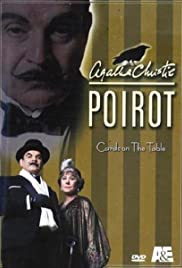
CARDS ON THE TABLE
UK, 2007, 103 minutes, Colour.
David Suchet, Zoe Wanamaker, David Westhead, Robert Pugh, Alex Jennings, Alexandre Siddig, Tristan Gemmill Honeysuckle Weeks., Lucy Lieman, Lesley Manville, Lindsay Marshall, Jenny Ogilvy, Douglas Reith,
Directed by Sarah Harding.
In Cards on the Table, the number of suspects is limited to 4 – although another is suggested. This means that the solution is not so surprising, one out of four. However, it is the motivations that make the difference as Well Is a postscript concerning the Superintendent.
At the centre is a mysterious Syrian millionaire with art interests. His played by Alexandre Siddig. At an exhibition, where Poirot and Mrs Ariadne Oliver, Zoe Wanamaker, who is to appear in other versions of Poirot novels, Shaitana, Arabic for Satan, discusses his trophies with Poirot, saying that he can outwit the detective, and have trophies of those who have killed without being caught.
The main action takes place at his home, four suspects of murder invited, Poirot and Mrs Oliver, a Colonel and the Superintendent from Scotland Yard. Shaitana is killed mysteriously.
Most of the action of the film then involves the interrogation of the suspects, flashbacks to the killings that they were involved in, investigations from the detectives and police, the gathering of all the suspects together and the unmasking of the murderer – not entirely surprising because of the limited number of suspects. However, homosexuality motivation is quite unexpected – as is the suggestion, the end, that the Superintendent has been involved with questionable behaviour and photographs.
The film has a strong cast including Zoe Wanamaker but also such veterans of British screen and stage, Alex Jennings and Lesley Manville.
The blame for the changes in the adaptation his sheeted home by the critics to the writer, Nick Dear.
1. The popularity of Agatha Christie mysteries? The television series? David Suchet as Poirot?
2. The adverse criticism of this episode? The plot alterations from the original novel? Behaviour of characters change, characters surviving not murdered? The most significant criticisms concerning the motivations of homosexuality, the behaviour of Dr Roberts, his relationships, the photographer and his camp behaviour? The intimations of homosexual behaviour by Superintendent Wheeler?
3. The London setting, the gallery, Shaitana’s home, décor? The flashbacks to the murders? The Amazon, Egypt, the home in the country? The musical score?
4. Poirot at the gallery, discussing sculptures with Mrs Oliver? Mrs Oliver and her later appearances in Poirot stories? Her flamboyant manner, dress, cigarettes? Manner of speech? Her novels, her detective and his style? Her investigations, misinterpreting the leads?
5. The introduction to Shaitana, his Syrian background, his wealth, the gallery? Look, sinister presence? Discussion with Poirot, his trophies, murderers undetected?
6. The guests, the dinner, Shaitana presiding, taunting the guests, indicating murders, secrecy? The challenge? Shooting, knives, poison?
7. The bridge games, the four suspects at the table, the detectives, writers and police at the other? The progress of the games? Shaitana and his presence? Eventually in the chair, asleep, dead?
8. The explanations of the four characters, the flashbacks to the killings? Those guilty, those not? The doctor, his practice, self-assurance, ladies man’, Mrs Craddock, the consultations, the affair, her going to Egypt, death from septicaemia? The doctor and his relationship with Miss Burgess in the office? Major Despard, an action character, time in the Amazon, the attraction to Miss Meredith, the background story, the drug crazed man, shooting him? Miss Meredith, her work for the elderly lady, the silver polish, her death? Mrs Lorimer, her secret about her daughter, pushing her husband down the stairs, her second marriage and the husband dying after a year? The reaction to being invited to the meal?
9. The four other players and the law, Poirot and his presence? Mrs Oliver? Hughes and his military background? Superintendent Wheeler, family man?
10. The range of interrogations, the suspects asked to describe the details of the room, the doctor accurate, Miss Meredith selective, the others not noticing much?, Mrs Oliver, her asking to be present at the questioning? The response of the others?
11. The various visits, Poirot to the doctor’s surgery, the encounter with Miss Burgess? Mrs Oliver, the friendship with the two young women? The interviews with Despard? Poirot and Mrs Lorimer?
12. The questions about Shaitana? The drugging? Drugging himself and self-confidence? A strange high? The murder planned or spontaneous? The stiletto? Poirot and his accusation of the Superintendent? Mrs Lorimer’s confession to save her daughter? Miss Meredith and Rhoda, the long friendship from school, living together, the lesbian intimations? On the lake, Rhoda attempting to kill her friend, the Major and his rescue?
13. The solution, not so surprising, that as it had to be one of the four? The eliminations? The doctor, his homosexuality, the photographs, the camp photographer and his models? The doctor and his affair? Spontaneously killing Shaitana?
14. Poirot accusing the Superintendent, envisaging his murdering? The photos – and the Superintendent and his compromising behaviour?
15. As an adaptation of the novel? And taking into account the criticisms of the numerous changes, as well as the introduction of the sexuality themes?